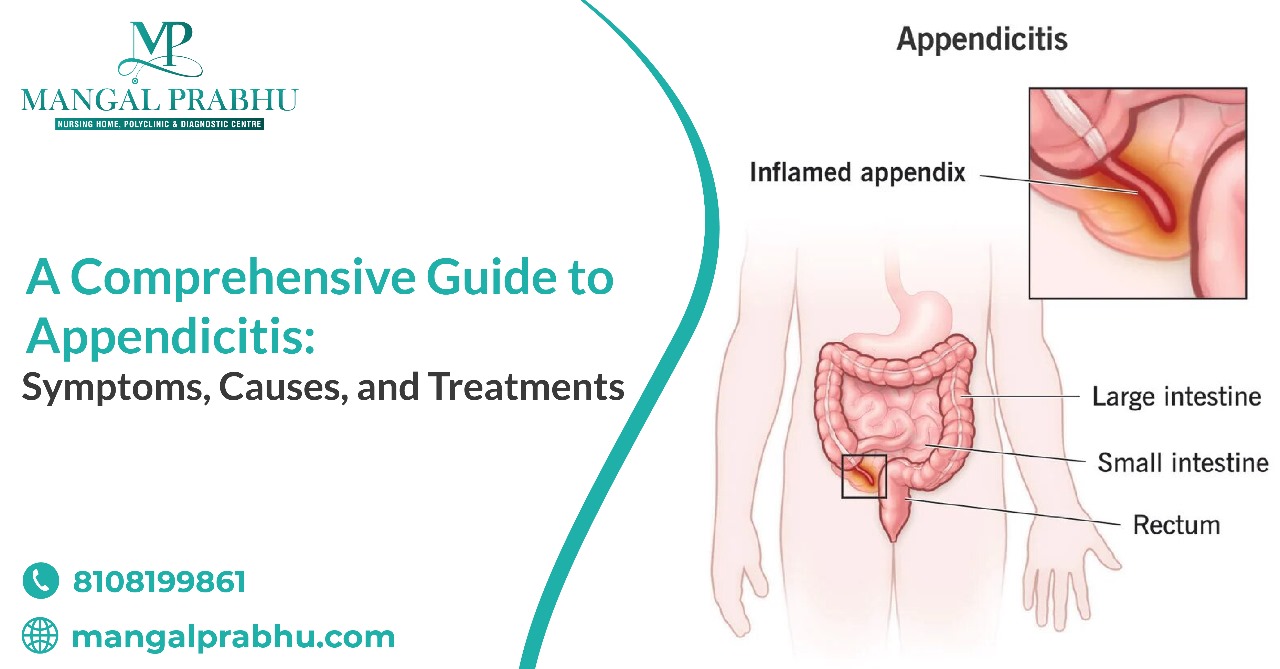
Introduction to Appendicitis
Appendicitis is a medical emergency when the appendix, a small, finger-like organ in the lower right side of the abdomen, becomes inflamed and infected. This condition can be extremely painful and, if left untreated, may lead to severe complications. This guide will explore the symptoms, causes, treatments, and prevention of appendicitis. If you’re in Navi Mumbai and require appendicitis treatment, it’s crucial to consult a skilled general surgeon in Navi Mumbai, such as those at Mangal Prabhu Hospital, who can provide timely and effective care.
Symptoms of Appendicitis
Recognizing the symptoms of appendicitis is essential for early diagnosis and prompt treatment. Common symptoms include:
i) Abdominal Pain
The most typical sign of appendicitis is a sharp pain that starts around the navel and gradually moves to the lower right abdomen. This pain often intensifies over time.
ii) Nausea and Vomiting
Many individuals with appendicitis experience nausea and may vomit due to the pain and discomfort.
iii) Loss of Appetite
A sudden loss of appetite is common when the appendix is inflamed.
iv) Fever
Appendicitis can lead to a low-grade fever, which may become more severe as the condition progresses.
v) Constipation or Diarrhea
Changes in bowel habits can occur, often with the patient experiencing either constipation or diarrhea.
vi) Abdominal Tenderness
The area around the appendix becomes tender and painful to the touch.
vii) Inability to Pass Gas
Some people with appendicitis find it difficult to pass gas.
Also Read: How To Reduce Appendix Pain?
Causes of Appendicitis
The exact cause of appendicitis is not always clear, but it is believed to result from one or more of the following factors:
a) Obstruction
Most cases of appendicitis are associated with a blockage in the appendix, often caused by stool, foreign objects, or an infection.
b) Infection
Infections within the digestive tract can lead to inflammation of the appendix.
c) Enlarged Lymphoid Follicles
Lymphoid tissue in the appendix can enlarge and lead to obstruction.
Treatments for Appendicitis
The standard treatment for appendicitis is surgical removal of the inflamed appendix, a procedure known as an appendectomy. This surgery can be performed using either traditional open or laparoscopic surgery, which is less invasive and typically results in a quicker recovery.
In some cases, if the appendix has formed an abscess (a pocket of infection), it may be drained before removing it surgically. It may involve a temporary drainage tube placement.
Prompt surgical intervention is crucial to prevent the appendix from rupturing, which can lead to severe complications, including peritonitis, a life-threatening infection of the abdominal lining.
Prevention of Appendicitis
- While appendicitis cannot always be prevented, some strategies may reduce the risk:
- Consuming a diet high in fiber may help prevent blockages in the appendix.
- Staying well-hydrated can help maintain healthy bowel function.
- Regular physical activity can promote overall digestive health.
- Practicing good hygiene, including regular handwashing, may reduce the risk of infection.
Conclusion
Appendicitis is a painful condition that requires prompt medical attention. You must consult a healthcare professional immediately if you experience symptoms like abdominal pain, nausea, vomiting, or fever. At Mangal Prabhu Hospital in Navi Mumbai, you can find experienced general surgeons who specialize in appendicitis treatment in Navi Mumbai. Early diagnosis and timely appendectomy are critical to a successful recovery and preventing complications. By understanding the symptoms, causes, and treatments of appendicitis, you can take the necessary steps to protect your health and well-being.



